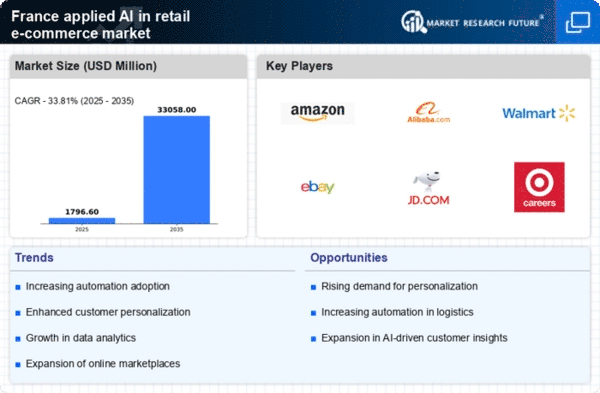Dynamic Pricing Strategies
Dynamic pricing is emerging as a significant driver in the applied ai-in-retail-e-commerce market in France. Retailers are employing AI algorithms to adjust prices in real-time based on various factors such as demand fluctuations, competitor pricing, and inventory levels. This approach enables businesses to maximize revenue and optimize sales strategies. Data suggests that retailers utilizing dynamic pricing can increase their profit margins by as much as 20%. As competition intensifies, the ability to implement flexible pricing strategies through AI will likely become essential for retailers aiming to thrive in the applied ai-in-retail-e-commerce market.
Enhanced Customer Insights
The applied ai-in-retail-e-commerce market in France is increasingly driven by the need for enhanced customer insights. Retailers are leveraging AI technologies to analyze consumer behavior, preferences, and purchasing patterns. This data-driven approach allows businesses to tailor their offerings and marketing strategies effectively. According to recent studies, approximately 70% of retailers in France are investing in AI analytics to gain deeper insights into customer journeys. By understanding customer needs more accurately, retailers can improve customer satisfaction and loyalty, which is crucial in a competitive landscape. The ability to predict trends and consumer demands through AI analytics is becoming a vital component of success in the applied ai-in-retail-e-commerce market.
Automation of Customer Service
Automation is a key driver in the applied ai-in-retail-e-commerce market, particularly in customer service. In France, retailers are increasingly adopting AI-powered chatbots and virtual assistants to handle customer inquiries and support. This shift not only enhances efficiency but also reduces operational costs. Reports indicate that businesses utilizing AI for customer service have seen a reduction in response times by up to 50%. Furthermore, the automation of routine inquiries allows human agents to focus on more complex issues, thereby improving overall service quality. As consumer expectations for rapid responses grow, the integration of AI in customer service is likely to become a standard practice in the applied ai-in-retail-e-commerce market.
Fraud Detection and Prevention
Fraud detection and prevention is becoming an essential driver in the applied ai-in-retail-e-commerce market in France. Retailers are increasingly utilizing AI algorithms to identify and mitigate fraudulent activities in real-time. By analyzing transaction patterns and customer behavior, AI systems can flag suspicious activities, thereby reducing financial losses. Reports indicate that businesses employing AI for fraud detection have seen a decrease in fraud-related losses by up to 40%. As e-commerce continues to grow, the importance of robust fraud prevention measures will likely intensify, making this a critical focus area for the applied ai-in-retail-e-commerce market.
Inventory Management Optimization
Effective inventory management is crucial for success in the applied ai-in-retail-e-commerce market. In France, retailers are increasingly adopting AI solutions to optimize their inventory levels and reduce waste. AI technologies can predict demand more accurately, allowing businesses to maintain optimal stock levels and minimize overstock situations. Studies indicate that retailers implementing AI-driven inventory management systems have experienced a reduction in excess inventory by approximately 30%. This optimization not only enhances operational efficiency but also contributes to cost savings, making it a vital driver in the applied ai-in-retail-e-commerce market.
















